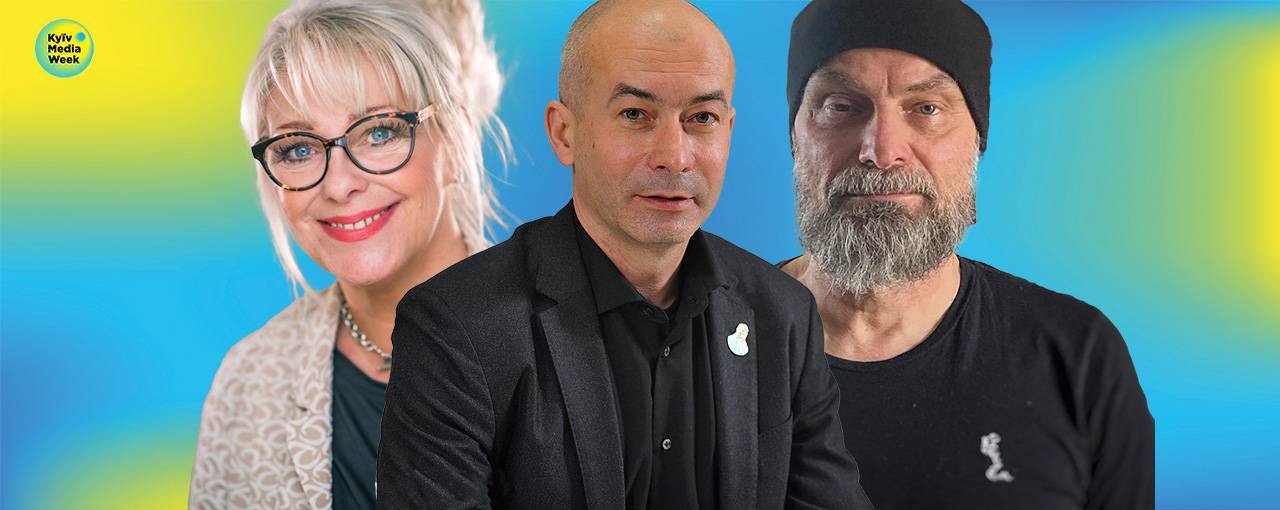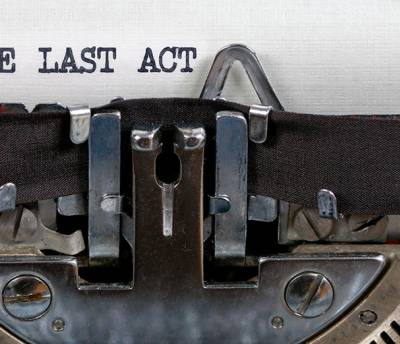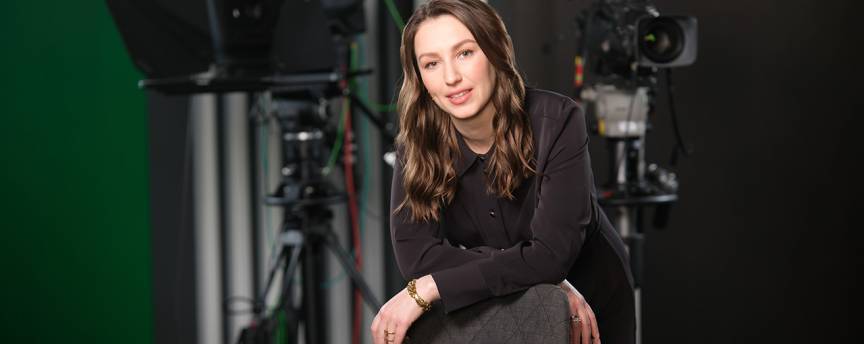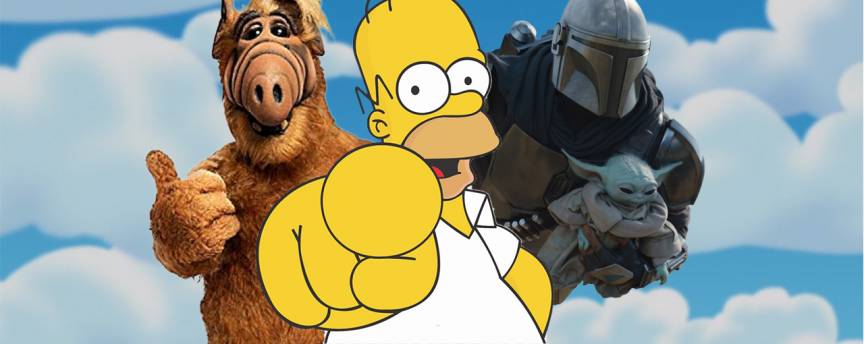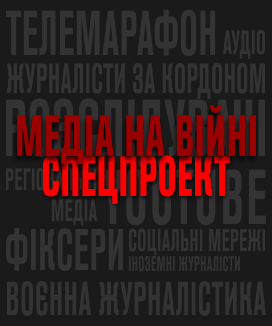This fall KYIV MEDIA WEEK, with the support of the United States Agency for International Development (USAID), successfully held six special events in cooperation with three European industrial forums. KYIV MEDIA WEEK 2022 Travel Edition started at the Serial Killer International Festival of Web and TV Series (September 20-25, Brno, Czech Republic). The midpoint of the Forum was at the MIA | International Audiovisual Market (October 11-15, Rome, Italy). KMW 2022 completed its journey at Europe's largest content market – the 38th International Co-Production and Entertainment Content Market MIPCOM (October 17-20, Cannes, France). Being partners with KMW, MBR presents a special project – KYIV MEDIA WEEK 2022 REVIEW – a brief squeeze of the key events of this year's KMW.
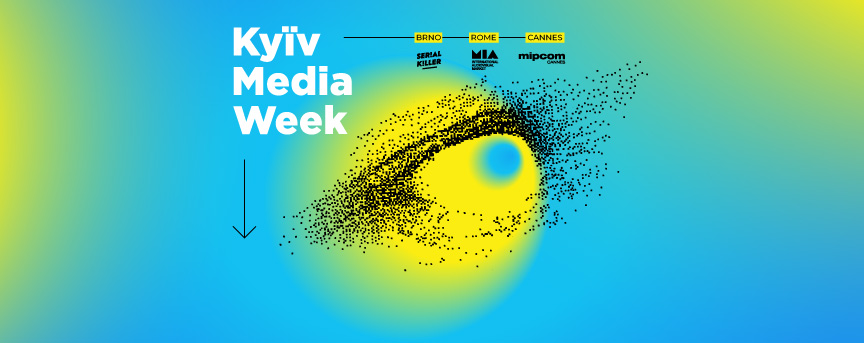
"Usually, when it comes to socially important content, everyone thinks that it is boring, too documentary. To some extent this is true, but it doesn't have to be like that," said Kateryna Vyshnevska, Head of Development and Co-Productions and Producer at FILM.UA Group, who moderated the KYIV MEDIA WEEK: Rome Chapter panel discussion The Social Impact of Content, which took place within the International Market of the Audiovisual Industry MIA in Rome.
This session combined two key narratives: the first focus was on the impact of entertainment content on people’s daily life and political agenda, and the second unveiled the importance of the European pubcasters’ support for Ukraine in its present-day reality.
The discussion was attended by Jarmo Lampela, Head of Drama at YLE, Andriy Taranov, Board Member at SUSPILNE UKRAINE, Dawn McCarthy-Simpson MBE, Managing Director Business & Global Strategy at PACT (Producers Alliance for Cinema and Television): trade body of Great Britain, representing and supporting independent manufacturing and distribution companies.

First of all, the speakers discussed the social responsibility of producers. "Every content creator should think about what is happening on the planet. After all, the content we produce is a reflection of our values and a reaction to events in the world," said Jarmo Lampela. "YLE exists on taxpayers' money, so our strategy is content for everyone. Our content should reflect the values of society: diversity, social responsibility, preservation of welfare in Finland, etc. And accordingly, when the political landscape in Europe changes so radically, we have to reflect the Finns' reaction to it – their thoughts and emotions." Lampela also emphasized that the events in Ukraine are of great concern to the Finns, since both countries have the same, as Jarmo put it, "problematic neighbor."
Dawn McCarthy-Simpson continued the conversation. She emphasized the influence of the British content industry and, accordingly, the higher degree of its responsibility: “Great Britain is the second largest exporter of content after the US, with a very strong independent production industry. The stories we tell travel the world. So we feel a responsibility to ensure that they have importance as well as the entertainment side because we can spread these stories more widely, more globally than others." In addition, Dawn emphasized that the support that British content makers currently provide to Ukraine is not an agenda handed from above, but a natural personal choice: "Producers understand what is morally right and what needs to be done."
Andriy Taranov joined the conversation via Zoom – due to constant russian shelling, he could not leave Ukraine, as he had to take care of the safety of his children. "Of course, since the beginning of the full-scale war, we have been focusing on news. People need to be updated on the situation in their region, city, and country in general. It is needed to prevent panic, resist fakes, get a better understanding of what is happening, and be protected as much as possible under the current conditions," – Taranov described the work of the Public Broadcasting Company of Ukraine since the beginning of the full-scale russian invasion. Andriy emphasized that the work of Suspilne has undergone technical changes: this includes the return of traditional radio broadcasting, as well as the rapid development of digital platforms – Telegram, Facebook, etc., which made it possible to better communicate with the young audience. "Later, we realized that we had to do more than just news," – continued Taranov. "First, we started helping people with limited access to content: we launched programs for children and older people. Now we understand that there is much more that needs to be done. These are areas of investigative journalism, and documentary projects (with an emphasis on documenting war crimes). But at the same time, we have to help people recover, therefore the entertainment direction is also very important. We are happy to have the BBC as our partner in hosting Eurovision in Liverpool next year. And this is a beautiful illustration of the cooperation and integration of British and Ukrainian cultures to bring people hope, some positive prospects."
Next, Dawn McCarthy-Simpson talked about another example of British-Ukrainian content cooperation – Sunflower TV – a children's Ukrainian-language YouTube channel without advertising, which collected the best programs and cartoons for Ukrainian children who are currently scattered around the world.

This PACT project has received industry-wide support, including production companies, broadcasters, distributors, and content creators in both the UK and Ukraine. Among the organizations involved: Aardman, All3Media; Banijay; BBC and BBC Studios; Channel 4; Channel 5's Milkshake!; S4C; Entertainment One; Fremantle; Glowberry; ITV and ITV Studios; Little Dot Studios; Mattel; Paramount and Nickelodeon; Sky; STV. Ukrainian companies supporting the project: Starlight Media, FILM.UA Group, and Glowberry. "YouTube has also joined the project, giving us a platform to launch the channel for free," – Dawn added.
She said that the key idea was to ensure that all Ukrainian children around the world have access to kids' content in their language. "All content creators and rights holders have provided us with their content for free, including popular brands like Peppa Pig and Mr. Bean," – McCarthy-Simpson said. “Everything happened very quickly: we knew that the issue of time was very important. The channel was launched at the beginning of July; currently, its audience is hundreds of thousands of people, to whom we offer hundreds and hundreds of hours of content. And we do not stop, we continue to expand."
Dawn also mentioned another PACT initiative in support of Ukraine – aimed directly at content creators. "We thought: talented producers in Ukraine want to tell the world a lot because their whole lives have changed one way or another. Therefore, they organized two workshops for producers of Starlight Media – one of the main Ukrainian television networks with six national and international channels. The workshops had scripted and non-scripted content sections. During the events, Ukrainian producers pitched their projects with co-production potential: both entertaining content and documentaries. We wanted to give them a sense of normalcy," – McCarthy-Simpson said.
Later, the conversation touched on the stereotype about the "boringness" of socially important content. "Socially important content is not necessarily boring. In fact, if it's boring, it's just bad content," Andriy Taranov emphasized the independence of boring or interesting content from its genre and focus.
As a fresh example of completely non-boring and at the same time socially important content, Kateryna Vyshnevska cited a special episode of the Finnish show Song of My Life, created by the Finnish production company Yellow Film & TV together with the Ukrainian companies 1+1 media and FILM.UA Group. This is the first case of such TV co-production: Finns and Ukrainians jointly developing and shooting an entertainment show dedicated to Ukraine and its culture, which is shown in both countries. "It was a big challenge for everyone to make it happen. We had a Ukrainian team, Ukrainian singers – people who traveled to Finland from Ukraine and from all over Europe," Vyshnevska said.

The Song of My Life show was developed by Yellow Film & TV production and YLE TV channel based on the original idea of content director Petja Peltomaa. Since 2019 the broadcaster has aired four seasons (the fifth is in pre-production). Song of My Life is the most popular entertainment TV show in Finland: during the last season, the average share of the project was 42-45%. The social component of the show is human stories that touch hearts. Heroes of the episodes (well known to the whole country) order a song related to the most important story of their lives. In the studio, the heroes watch vocalists performing these songs and try to guess who each song belongs to. In the special episode of Song of My Life, the heroes of the project, the song performers, and the host of the show were from Ukraine; but Finnish artists and a host also took part.
"Usually, co-production is expensive, slow, difficult, and requires compromises. But there is no point in waiting – you have to act and find solutions. Not in three or four years, but now," Jarmo Lampela summed up. And at the moderator's request, he spoke a little about Nordic12 – an example of a clear structure and effective mechanism that facilitates co-production. Nordic12 is an association of content makers in Northern Europe created to stimulate the production and distribution of drama series. "This is a great example of collaboration that has become a response to the need for content and unification," Lampela emphasized.
The first wave of Nordic12 cooperation consists of twelve drama series created by the Nordic public broadcasters: DR (Denmark), YLE (Finland), SVT (Sweden), NRK (Norway), and RÚV (Iceland), which they will be able to share. The system envisages that each completed series will be available on public broadcasters' streaming services over the next year; some series will also be aired on traditional television. This cooperation allows Northern European content to "travel" better between the countries of the region, increase the number of Scandinavian co-productions, and standardize and optimize processes in it. "Nordic12 also helps in finding international co-production projects because this is already a sign of quality," Jarmo said.
Picking up the topic of scripted content, the speakers discussed the issue of its social importance. "I think scripted content is generally underestimated in terms of its impact on people. However, we in Ukraine are beginning to understand its influence," – said Kateryna Vyshnevska. "Recent events have shown that Ukraine and Europe have more in common than it might seem at first glance. Scripted content has great potential for co-production, and at the same time, it carries our values – values that should be shared with others."
"We have so many stories that need to be told," continued Andriy Taranov. "And these stories – sometimes dramatic, sometimes even funny – can travel, cross borders, touch the lives of people from different countries." Regarding Suspilne's actual co-production screenplay projects, he told about cooperation with Poland: "We are currently negotiating with Polish partners to produce a large amount of content that will "revise" our common history and create a narrative in which we can live in the future." Taranov also mentioned the presence of certain legal inconsistencies that complicate co-production with Ukraine but noted that they are being corrected at the legislative level. "So hopefully, when this adjustment is complete, we will become more flexible and adaptable in this matter," he concluded.

